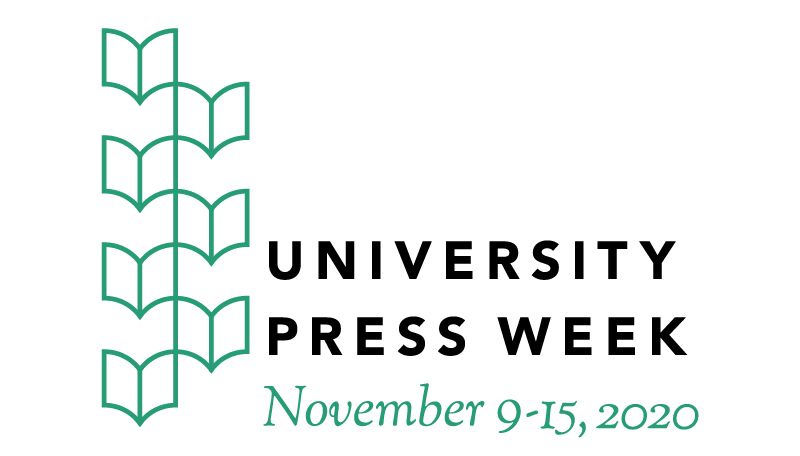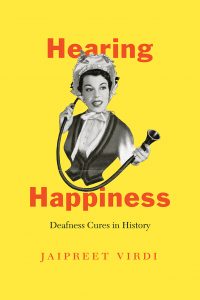RaiseUP: Read an Excerpt from “Hearing Happiness” by Jaipreet Virdi

Emphasizing the role that university presses play in elevating authors, subjects, and whole disciplines that bring new perspectives, ideas, and voices to readers around the globe, the Association of University Presses has chosen “Raise UP” as the theme for this year’s University Press Week, which runs through November 15. “Raise UP” is a particularly apt theme in a time when information moves at faster speeds than ever before across all platforms. It’s critical that scholarship about the most important ideas of the day is nurtured, championed, and made widely available.
We’re proud to participate in the UP Week blog tour, along with our colleagues at the University of Notre Dame Press, the University of Alberta Press, the University Press of Florida, University of South Carolina Press, Bristol University Press, Amsterdam University Press, University of Toronto Press, Bucknell University Press, Vanderbilt University Press, University of Minnesota Press, Harvard University Press, and Columbia University Press, to honor today’s theme of “Active Voices.”
What follows is a powerful excerpt from the Introduction to Hearing Happiness: Deafness Cures in History by Jaipreet Virdi, a historian and truly inspiring and active voice for disability rights and awareness. At the age of four, Virdi’s world went silent. A severe case of meningitis left her alive but deaf, suddenly treated differently by everyone. Her deafness downplayed by society and doctors, she struggled to “pass” as hearing for most of her life. Never quite deaf enough for the Deaf community or quite hearing enough for the “normal” majority, Virdi was stuck in aural limbo for years. It wasn’t until her thirties, exasperated by problems with new digital hearing aids, that she began to actively assert her deafness and reexamine society’s—and her own—perception of life as a deaf person in America.
When I was four years old, I became ill with bacterial meningitis and nearly died.
It was November 1985. We were living in Kuwait at the time, before the Gulf War displaced and scattered my close-knit family across disparate lands. These were still days marked by weekend treks to the desert, where my dad cooked kebabs; days of unexpected playdates and jubilant birthdays. I was an energetic, talkative child who learned six languages but remained shy when reciting the Sikh ik onkar prayer from memory in front of our family and congregation. There’s a photo of me in the family album: I’m sitting in a bumper car at a fair, wearing a gray dress with a white collar, my hair in plaits, my cheeks flushed, and my eyes forlorn. I never thought it was a happy photo and often wondered why it was taken in the first place. Other times I’m glad it remains secured in the album because it serves as a memento of the time everything changed. It captures the moment when my parents realized I was seriously ill.
The doctor initially dismissed my parents’ concerns about my febrile state. It was nothing more than a bout of the flu, he repeatedly soothed them. Yet my symptoms refused to cease, and my temperature spiked to dangerously high levels. Shortly thereafter, I was hospitalized. Through blurry memories, I recall the screams and the tears. The scissors cutting my favorite salwar kameez, the burgundy one with embroidered white roses on soft silk. I cherished it. It was the most beautiful outfit I owned and within a few seconds, the doctor slashed it from my body. All the beauty and love it once embodied were reduced to shredded fabric causally thrown on the floor.
The scissors remained on the bed next to my frail, thin body. I sat there in my white underclothes, crying, unable to comprehend what had happened.
I remained bedridden for six months. I recall the loneliness and confusion: shadows dancing on the walls, wails as my mom closed the door behind her as she left for the evening, the feverish heat that stole many hours of daylight. The friendly voice of a neighboring boy who kept me awake with grand stories of everlasting friendship, stories whose magic and mystery floated through darkness, dissipating in the fluorescent streams that emitted from the hallway. For all I know, the boy never existed, his voice nothing more than mist in the air, carried away by the ghosts of the night. There are moments that stay with you, dividing the before and the after as silence slowly cloaks your world. The face of loved ones who look at you with pity, the sighs of exhaustion as they patiently try to understand your jumbled voice. The soft sobs that cradle you to sleep, the unknown sounds resonating through the hospital hallways.
For a long time, I never understood that I lost my hearing. I believed the world had changed and everyone simply stopped noticing me.
Like many parents faced with the illness of a child, my mother was overjoyed about my return to health but devastated by the realization that I would never be the same. I was deaf. My speech was reduced to a series of incomprehensible garbles. Convinced my deafness was divine punishment for her failings as a parent, my mother worried endlessly about how she could bring back that boisterous child of hers. How to explain to me that the sickness that ravaged through my brain had transformed both of our worlds. She fretted over communication, because she no longer knew how to speak to a child who could not—or would not—respond, a child who showed no indication of understanding simple instructions, let alone complex thoughts. She demanded the doctor correct his error and fix what was broken. She asked everyone for advice and suggestions for medical remedies that could possibly heal me, no matter how far-fetched they seemed.
Countless hours were spent in the gurdwara (Sikh temple) asking for divine intervention. When the gurdwaras of Kuwait proved insufficient, I was whisked away to the Golden Temple in India. My grandfather recommended a series of healing herbs and tinctures. Sympathetic family and friends prescribed their own herbal solutions, secret recipes passed through family hands for generations. Once, when a Hindu shaman was traveling through town, I was taken to visit him in the hopes his direct link to divinity could be passed on to me. I was instructed to sit next to him as he spoke to the congregation; much to my mother’s disapproval, I squirmed throughout the sermon, trying to remove the heavy hand placed upon my head. The shaman then presented me with a copper bracelet blessed with healing powers, which I wore until the circumference of my wrist outgrew that of the bracelet. They bejeweled me with rings they said were endowed with natural powers, burned special incense for me, fed me healing foods. While my family fished for a miracle, I withdrew into a world of my own making.
The frustration that followed failed treatments led to anger. My father blamed my mother. My mother blamed the doctor. She insisted that the severe progression of my illness and even the reason I became sick in the first place was because the doctor prioritized the Arab Kuwaiti citizens and refused to sign off on additional tests until it became too late. And I blamed myself: I must have done something naughty to deserve this. The more I withdrew into my world, the more my family rallied around me, speaking louder and writing things for me to read, or clapping to get my attention. They asked, repeatedly, perhaps frustratedly, how much of my hearing was lost. They received only silence in return, a stubborn refusal to answer.
My mother sent my files to a friend in England for a second opinion. A few months after being discharged from the hospital, I still couldn’t stand up or walk, so an English doctor prescribed medication for balance to help me regain my mobility. A trip to the Sick Children’s Hospital in London followed. There, I was given a large orange hearing aid with headphones awkwardly strapped in a harness on my frail chest. Their promise of amplification did little to improve my world, but they were better than nothing, better than the exclusion of silence. The sounds, however, were difficult to understand, especially garbled speech; and the hearing aid itself was uncomfortable to wear. Searches for cures continued for two more years. Eventually we immigrated to Canada, where eventually I was fitted with my first analog behind-the-ear hearing aids. They were large on my ears, but with them, my auditory world changed once again: I could discern between different sounds, hear my parents’ voices clearly, and even—to some degree before closed captioning—understand television.
My family’s response to my illness and subsequent deafness is a common one among hearing families. It is a tragedy, a misfortune that plagues the household, when a child is deprived of one of her senses—it is all too easy to see her as “broken.” It becomes difficult to face the new reality of special treatment and special education. It was a reality even my younger siblings had trouble grasping. One of my sisters, three years younger than me, would constantly tap on my shoulder to get my attention, never fully understanding why I could not play with her as I used to. Playtime with her and my cousins became a new dynamic: to others, my words were unintelligible, my tears lacked explanation, and there was always a wall between us that I could never penetrate. It was easier to sit on the sidelines and watch.
It was not until we settled in Toronto and I was enrolled in a special class that I realized there were other children like me. Slowly I came to understand that I was hard of hearing and the implications this had for my life. Speech therapy (lipreading) was required to transform garbled strands of speech into articulated words. I was deaf, hearing aids helped me to hear, but speech-reading let me “fill in the blanks.” I never formally learned sign language, though I did know its alphabet and used it as a secret code to talk with my friends.
I became obsessed with hearing, mostly out of fear that I would miss out on what everyone else was experiencing. From my perspective, everyone else heard better—even my classmates—and I was constantly struggling to catch up, to participate in jokes or understand song lyrics that others were singing. I used to blindfold myself to train my ears to hear only through my hearing aids. By the time my friends and I reached high school, we had carved our own paths to better adjust ourselves to the world. I was placed in a gifted education program and fully integrated into a hearing school (a process called “mainstreaming”). Some of my friends stopped speaking and wearing hearing aids, preferring sign language as their primary mode of communication, becoming full-fledged members of the Deaf community. A few got fitted for cochlear implants. Eventually I became an outsider in the same community in which I had once found a sense of belonging, because I had become too “hearing” to be “deaf.” I had an audiological impairment, yes, but I was not culturally Deaf: I did not sign, belong to any Deaf organization, or participate in any Deaf events. But my “accent,” the result of a speech impediment, gave away the fact that I was not truly “hearing.” For years, I was stuck in the limbo between two worlds: never quite deaf enough or quite hearing enough to perfectly fit in one side or another.
Jaipreet Virdi is assistant professor of history at the University of Delaware. This is her first book. Find her on Twitter at @jaivirdi or visit her website www.jaivirdi.com.
Hearing Happiness is available on our website or from your favorite bookseller.
